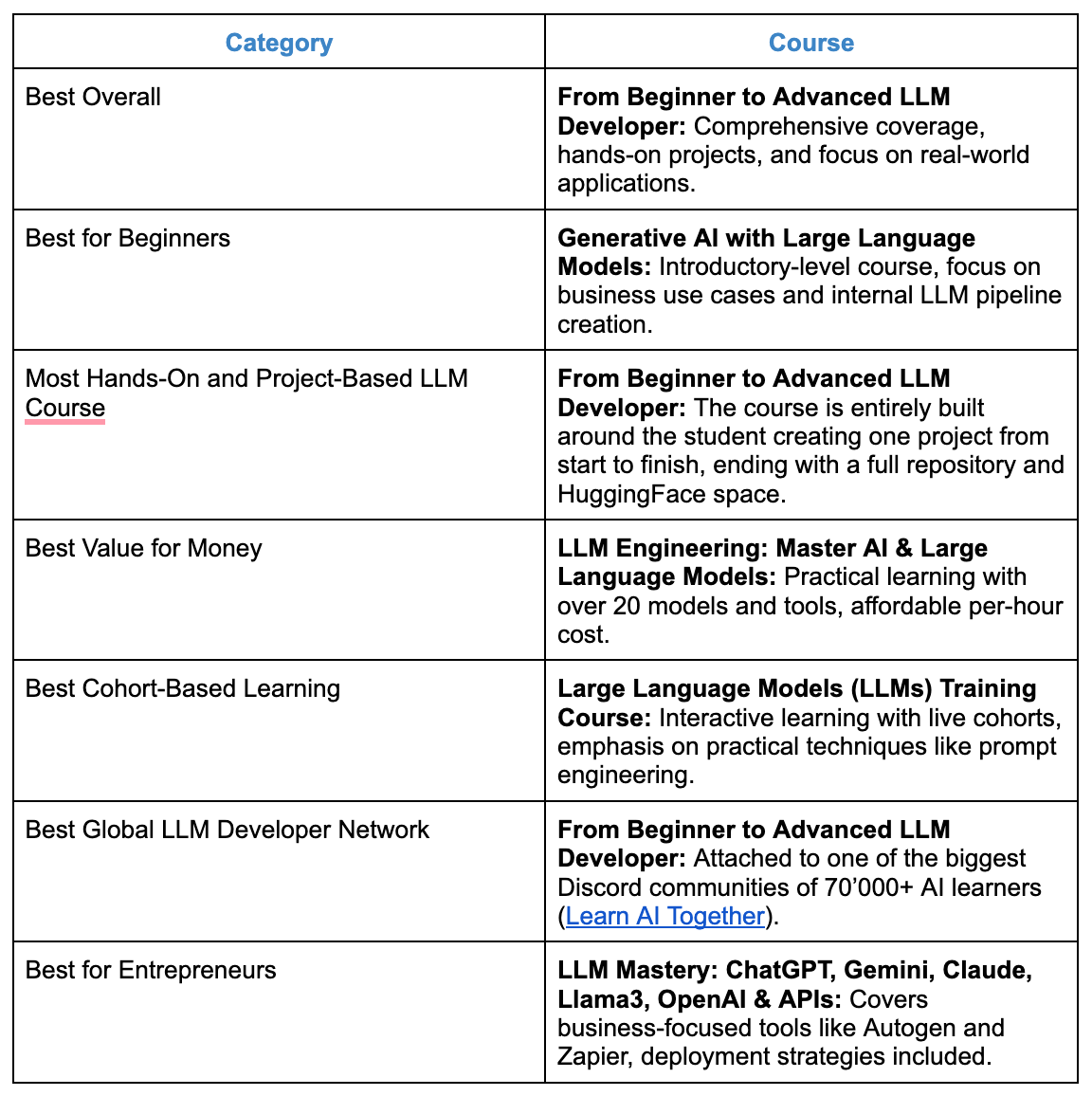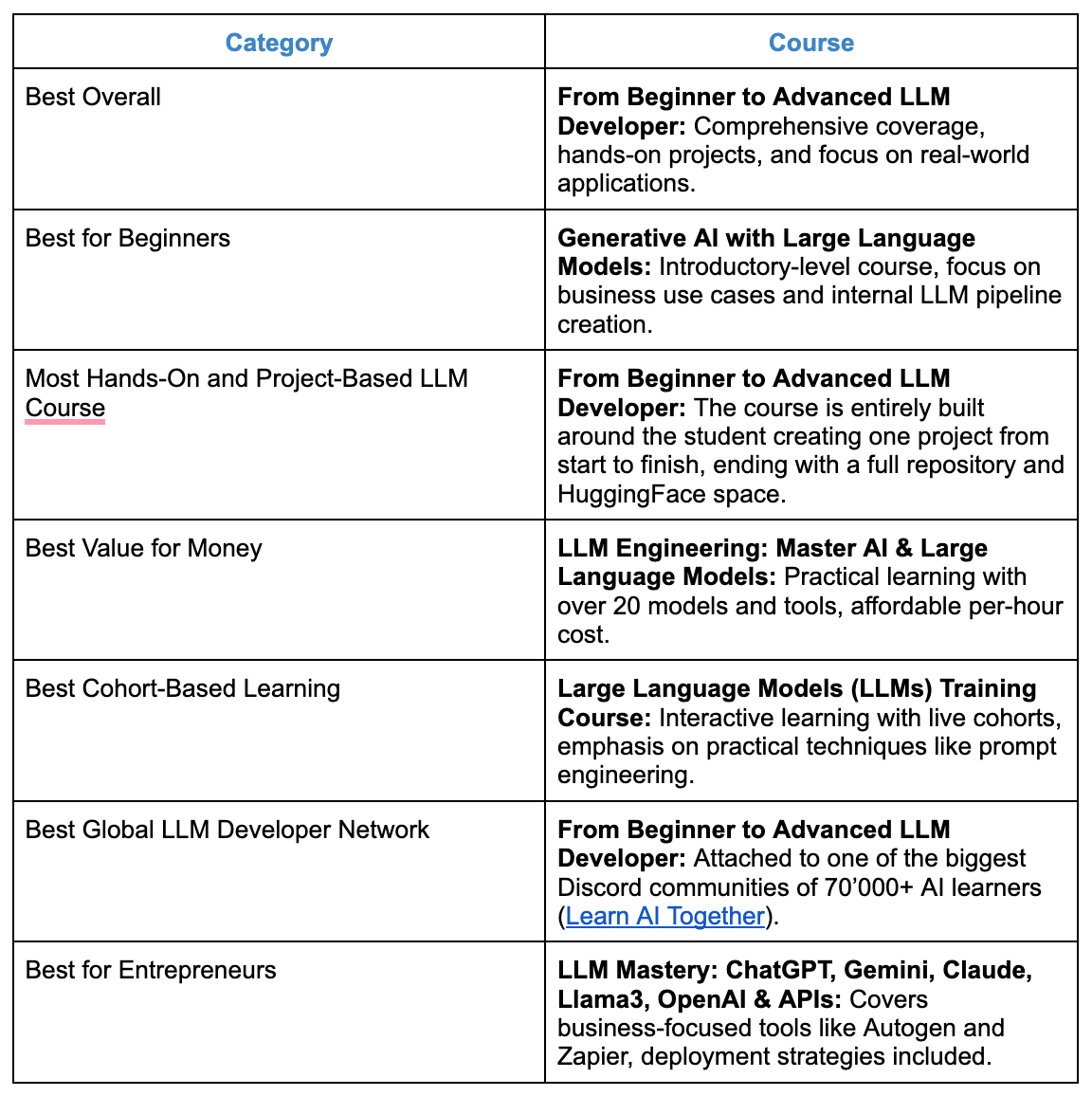The Best 'LLM Developer' Courses in 2025
Become an expert LLM developer with these courses

LLMs are becoming integral to industries like finance, healthcare, and software development, offering opportunities to significantly reduce development time and costs while unlocking new capabilities. However, harnessing their potential requires building highly tailored pipelines. This demand for customized solutions cannot be fulfilled by software developers or machine learning engineers alone; it requires the creation of a new role: LLM Developer. This new discipline combines core technical proficiencies, such as data curation, building LLM Pipeline, fine-tuning, and tool integration, with critical non-technical skills, including entrepreneurial decision-making and industry-specific insights.
Widescale generative AI adoption will require thousands of LLM developers, creating countless job opportunities. Those learning the technology today, will be best placed to get maximum benefits out of it.
However, finding the right course to develop expertise in large language models (LLMs) can feel like navigating a maze. With the field advancing so quickly, it’s hard to know which options truly deliver the skills and insights you need to succeed. Some courses focus on technical depth, while others emphasize real-world applications — but how do you choose the one that’s right for you?
This post presents a list of courses that offer the most effective pathways for learners at different skill levels to develop the unique abilities required to excel as LLM developers.
Let’s explore the courses!
TL;DR:

Generative AI with Large Language Models
Platform: Coursera
Learning Method: Self-Paced
Duration & Cost: 16 hours, $49 ($3 per hour of learning)
Best For: Learning business use cases.
This is an intermediate-level program tailored for developers with experience in Python. It covers the essential concepts behind LLMs, including their training, fine-tuning, optimization, and deployment for practical, real-world applications.
The course is structured around three modules. The first module explores generative AI use cases and the typical lifecycle of LLMs, from data collection to deployment. The second module delves into model fine-tuning and evaluation, while the third focuses on reinforcement learning and LLM-driven applications.
This course offers hands-on insights into generative AI, helping you build and deploy models while making informed decisions for your projects and organization.
From Beginner to Advanced LLM Developer
Platform: Towards AI Academy
Learning Method: Self-Paced
Duration & Cost: 50–80 hours, $249 ($3–5 per hour of learning)
Best For: Industry-centric end-to-end learning with several hands-on projects using advanced techniques, models, and frameworks.
This certification course (a bit biased by our team writing this) offers a complete learning path for developers transitioning into LLM development. Designed for software developers, ML engineers, data scientists, or anyone with intermediate Python and GitHub skills, it equips you to build real-world AI applications and pursue careers as LLM developers or AI engineers.
With 90+ lessons (~50+ hours) and hands-on projects, learners will master core LLM skills by building an AI tutor using tools like OpenAI, LlamaIndex, and Gradio. Key topics include LLM APIs, prompt engineering, RAG pipelines, fine-tuning, LLM agents, diffusion models, and APIs, alongside essential non-technical skills like communication and entrepreneurial thinking.
By the end of the course, learners will have a working LLM project to showcase as a portfolio piece, MVP, or internal AI solution.
Systematically Improving RAG Applications
Platform: Maven
Learning Method: Cohort-based
Duration & Cost: 6-weeks/25 learning hours, $1,650 ($66 per learning hour)
Best For: Building and improving RAG applications.
This course provides a structured, data-driven approach to building and optimizing RAG systems, moving beyond trial and error to achieve continuous improvement.
Key topics include synthetic data generation, retrieval metrics (precision and recall), user behavior analysis, clustering, and tracking tools for prioritizing enhancements. Advanced techniques such as query routing, domain-specific embeddings, fine-tuning, re-rankers, and quantifiable tool selection are covered to enhance retrieval accuracy.
Participants will work on projects involving structured data, multimodality (images, tables, documents), and integrating multiple search methods. Reliability and scalability are addressed through frameworks for latency management, UX design, and feedback loops. Combining live sessions with detailed lessons, the course offers a practical, hands-on approach to achieving consistent RAG performance.
LLM Engineering: Master AI & Large Language Models (LLMs)
Platform: Udemy
Learning Method: Self-Paced
Duration & Cost: 25.5 hours, $49.99 ( $1.96 per hour learning ) (Without Discount)
Best For: Experience with over 20 models and platforms like HuggingFace, LangChain, Gradio, and Weights & Biases.
This 8-week video course provides a practical introduction to generative AI and LLMs for developers with Python experience. Key topics include Generative AI foundations, transformer architectures, RAG, QLoRA fine-tuning, and agentic workflows. Participants will evaluate frontier and open-source models to understand their strengths and real-world applications.
Projects focus on building an AI-powered brochure generator, designing a multimodal customer support agent, optimizing Python code to C++ for performance, and creating AI knowledge workers using RAG workflows. The capstone project challenges learners to fine-tune and deploy LLMs to tackle complex business problems.
Complete the Generative AI Course with Langchain and Huggingface
Platform: Udemy
Learning Method: Self-Paced
Duration & Cost: 50 hours, $94.99 ($1.9 per hour learning)
Best For: Learning Langchain and Huggingface to build, deploy, and optimize AI applications.
This course offers 50+ hours of video content, downloadable resources, and supplementary articles, focusing on LangChain and HuggingFace for building, deploying, and optimizing AI applications. Designed for developers with Python and basic machine learning knowledge, it includes real-world projects to build practical generative AI skills.
Key topics cover foundational concepts of generative AI, LangChain setup, and HuggingFace pre-trained models. The curriculum highlights fine-tuning for chatbots, content generation, and data augmentation systems, with a core focus on building RAG pipelines that integrate generative AI with retrieval systems for enhanced performance and information access.
Large Language Models (LLMs) & Text Generation
Platform: Udacity
Learning Method: Self-Paced
Duration & Cost: 2 Weeks, $249/month (+ access to other services)
Best For: Understanding essential NLP techniques, including tokenization and text encoding.
This two-week course provides Python developers skilled in deep learning, PyTorch, and Hugging Face with practical expertise in building and deploying LLMs.
Topics include LLM fundamentals, prompt engineering, tokenization, text encoding, and transformers. Hands-on projects focus on applying RAG to integrate LLMs with external datasets, creating tools like Q&A bots, and building custom datasets for fine-tuning. The course also covers methods for creating custom datasets to effectively fine-tune models.
The final project involves developing a custom chatbot using a dataset of choice, offering a strong foundation for applying LLMs to real-world tasks.
Large Language Models (LLMs) Training Course
Platform: Edureka
Learning Method: Cohort- Based Course
Duration & Cost: 24 Hours (4 Weeks), $199 ($8.2 per hour learning)
Best For: Learning prompt engineering, how to craft effective prompts and parameter-tuning techniques.
This course offers a comprehensive introduction to generative AI and LLMs, covering fundamentals, applications, and generative models like GANs and VAEs. Designed for developers, data scientists, and AI enthusiasts, this course requires basic Python and machine learning knowledge.
Key topics include transformer architecture, open-source LLMs, HuggingFace, and practical techniques such as prompt engineering, parameter tuning, and fine-tuning.
Projects focus on RAG, word embeddings, chunking, and vector databases, with frameworks like LangChain and LlamaIndex for building LLM-based applications.
Large Language Model Course
Platform: Github
Learning Method: Self-Paced
Cost: Free
Best For: The mix of theory and hands-on projects, such as LLM foundation with essential math.
This course provides a comprehensive roadmap to master LLMs through theory and hands-on practice, structured into three sections.
LLM Fundamentals covers key math, Python for ML, neural networks, and NLP basics like text preprocessing, embeddings, and recurrent networks. The LLM Scientist dives into Transformers, attention mechanisms, text generation, dataset building, fine-tuning (LoRA, QLoRA), RLHF, quantization, and trends like multimodal models. The LLM Engineer section focuses on deploying LLMs via APIs, vector storage, RAG, inference optimization (Flash Attention, speculative decoding), and strategies for local, server, and edge deployment.
The course includes two interactive assistants, HuggingChat and ChatGPT (premium is required), practical notebooks, and resources for topics like evaluation, fine-tuning, and quantization.
Certified LLM Developer
Platform: blockchain-council
Learning Method: Self-Paced
Duration & Cost: 13+ Hours, $229 ($17 per hour learning)
Best For: Learning how to deploy models using Flask, FastAPI, and Docker.
The Certified LLM Developer program is a self-paced course designed for developers, data scientists, and AI enthusiasts to deepen their AI expertise and master LLM technologies in real-world scenarios.
The course covers LLM fundamentals, including tokenization, embeddings, attention mechanisms, fine-tuning models like GPT and BERT, and using frameworks such as Hugging Face, LangChain, and Ollama for conversational agents and LLM deployment.
Additional modules explore computer vision with CNNs in TensorFlow, audio processing for speech recognition and classification, and video signal processing techniques.
Hands-on projects include building text classification and generation models, creating conversational agent architectures, and deploying models using Flask, FastAPI, and Docker. The course also introduces MLOps concepts for managing deployment and monitoring performance. This program concludes with a certification exam (up to three retakes are allowed).
LLM Mastery: ChatGPT, Gemini, Claude, Llama3, OpenAI & APIs
Platform: Udemy
Learning Method: Self-Paced
Duration & Cost: 20+ Hours, $84.99 ( $4.2 per hour learning) (Without Discount)
Best For: Building AI agents with LangChain, Flowise, and Autogen and deploying open-source models like Llama 3 using tools like LM Studio.
This course offers a complete guide to understanding and applying LLMs in real-world scenarios. It covers foundational and advanced concepts through videos, articles, and downloadable resources, making it suitable for developers, data scientists, AI enthusiasts, entrepreneurs, and anyone interested in using LLMs for various tasks.
Key topics include LLM parameters, transformer architecture, fine-tuning, RLHF, and scaling laws. Advanced concepts cover multimodal text-visual processing, RAG, and prompt engineering techniques like chain-of-thought prompting.
Practical skills include API integration with OpenAI, Google Gemini, and Claude, building AI agents with LangChain, Flowise, and Autogen, and deploying open-source models like Llama 3 using tools like LM Studio. The course emphasizes security, tackling prompt injection, and jailbreak prevention. It also explores embedding vector databases, Zapier integration, and AI agent creation using CrewAI and Microsoft Autogen.
ChatGPT and LangChain: The Complete Developer’s Masterclass
Platform: Udemy
Learning Method: Self-Paced
Duration & Cost: 12+ Hours, $99.99 ($8.3 per hour learning)
Best For: Using ChatGPT, OpenAI Plugins, and LangChain components.
This course equips software engineers with basic Python skills to build AI-enabled, production-ready applications using ChatGPT and LangChain.
Key topics in the course include creating custom text-generation pipelines, integrating user feedback, implementing RAG, managing conversational memory, and semantic search with embeddings. Learners will work with vector databases like ChromaDB and Pinecone, automate tasks with agents, and extend LangChain for server-to-browser text streaming. They will also learn to use OpenAI Plugins for capabilities like database access and code execution, performance maintenance with distributed processing tools such as Celery and Redis, and observability enhancement with tracing.
Practical projects include a web app with “Chat-with-a-PDF” functionality, document uploads, and user authentication. Downloadable resources shared through the course ensure developers can integrate advanced AI capabilities into real-world applications.
GenAI 360 Courses (One Bundle)
Platform: Activeloop (Collaboration with Activeloop, Towards AI, & Intel Disruptor Initiative)
Learning Method: Self-Paced
Duration & Cost: 100+ Hours & Free
Best For: Building foundational LLM understanding for production.
The GenAI360 Foundational Model Certification is a three-course series designed to help engineers, executives, and enthusiasts develop expertise in LLMs. This bundle combines theory and practical application, covering training, fine-tuning, operational techniques, and production deployment. Participants are recommended to have intermediate knowledge of Python and familiarity with Jupyter Notebooks and GitHub.
The first course, LangChain & Vector Databases in Production, focuses on building applications powered by LLMs using LangChain and Deep Lake. The second course, Training & Fine-Tuning LLMs for Production, equips participants to train and fine-tune LLMs using methods such as LoRA, SFT, and RLHF. Learners will work on preparing datasets, training models in the cloud, and deploying tailored LLM solutions for specific use cases. The third course, RAG for Production, equips participants to design retrieval systems for AI applications.
The series concludes with the Impossible GenAI Test, a challenging assessment designed to evaluate understanding of core concepts across the courses.
